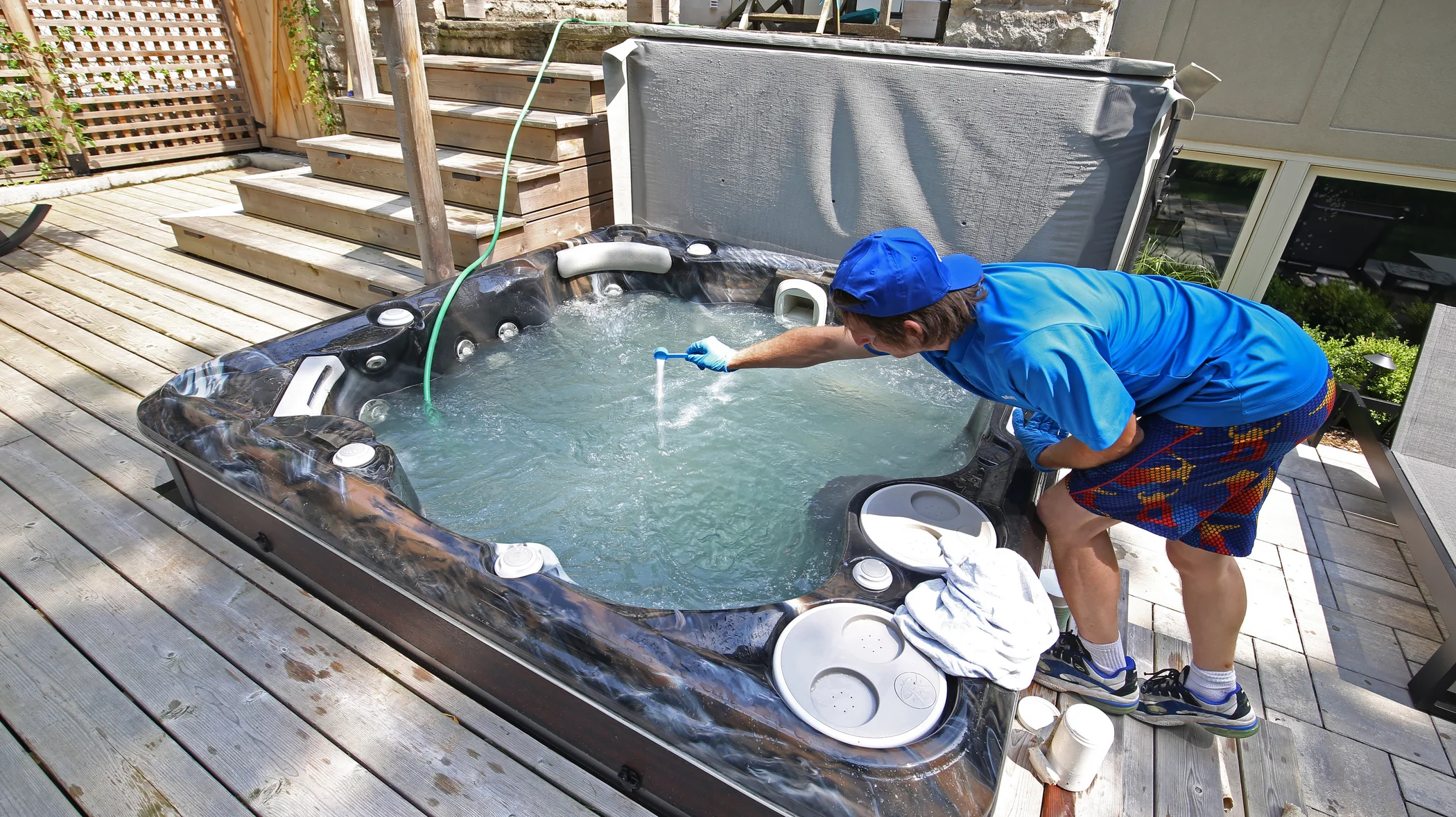A Guide to Hot Tub Chemicals: What you REALLY need to know

While the warm water of a hot tub makes it the ideal escape to relax and unwind at the end of the day, its water can also be a place for germs to grow. Keeping your hot tub water clean is part of the responsibilities of anyone who owns a hot tub!
To keep hot tub water clean and sanitary, there is an assortment of recommended chemicals to use. But what are they?
We get asked at Hydropool frequently about what chemicals are required for owning a hot tub. So in this article, we want to explain everything you need to know to have a functioning hot tub experience.
We will discuss:
- What chemicals and supplies do you need to have for your hot tub?
- What does each chemical do?
- Why chemicals and supplies are required for hot tubs?
Hopefully, by the end, you’ll have a strong sense of what chemicals you need when you own a hot tub and what they each do for you!
What Chemicals Do I Need to Have for My Hot Tub?
The must-have list of chemicals and supplies for your hot tub includes:
- Water test kits
- Hot tub filter cleaner
- Spa shock (both chlorine and non-chlorine shock are necessary)
- Bromine or chlorine tablets
- pH up
- pH down
- Stabilizer
- Chlorine granules
- Scale remover
There are a few others you could also add, depending on your circumstances. We will discuss each of these in turn.
What Does Each Hot Tub Chemical Do?
1. Water test kits: Essential for regularly monitoring the chemical balance of your hot tub water to ensure it is safe and healthy for use. The strips reveal the chemicals in various colors: For example, chlorine shows up as purple in many test strips. If it’s dark purple, your chlorine is too high, if it’s white or too light purple, you need to add more. Test strips generally cost about $12-$15 per container in Canada, but advanced water testing kits can go up to hundreds of dollars. Most people are just fine with test strips.
2. Hot tub filter cleaner: Keeping your filter clean is crucial for efficient filtration and circulation of water in your hot tub. There are two kinds: One in which you soak the filter overnight every few months or there’s a spray that you use each time you rinse your filter (usually weekly). Either can work.
3. Spa shock: Both chlorine and non-chlorine shock are necessary for eliminating contaminants and maintaining water clarity. What can be confusing here is that in most cases, neither of these are actually called “shock” on the bottle. Shock is actually an industry term for oxidizers. What shock does is oxidizes or turns things like body oils, sweat and other elements you don’t want in your hot tub into gas. It’s used weekly.
4. Bromine or chlorine tablets: These tablets are essential for sanitizing your hot tub water and preventing the growth of bacteria and algae. You choose one or the other, not both.
5. pH up and pH down: Balancing the pH levels of your hot tub water is vital for optimal water quality and comfort. When doing your weekly testing, setting pH comes first!
6. Stabilizer: Helps maintain the effectiveness of chlorine or bromine in your hot tub water. One of the most notable chemicals a hot tub needs is chlorine. If it was just to be added alone, it would quickly break down and not work. Chlorine needs stabilizers to prevent their breakdown and work to keep your hot tub water safe and clean. Hot tub stabilizer is a chemical cyanuric acid. When exposed to sunlight, it reduces the amount of chlorine needed to keep the water clean. Chlorine reacts with ultraviolet rays when exposed to sunlight and breaks down, requiring more chlorine to be added to the water. Hot tub stabilizer is used to bond with the chlorine, helping prevent this reaction. It stops the chlorine from quickly breaking down, eliminating the need to constantly be adding new chlorine and saving you money by using fewer chemicals.
7. Chlorine granules: An effective sanitizer for killing bacteria and maintaining water cleanliness. It is used to “shock” your hot tub – see above, as it is also called “shock.”
8. Scale remover: Prevents and removes scale buildup caused by hard water in your hot tub.
Are There Any Other Chemicals I Might Need for My Hot Tub?
Additionally, you may consider adding water polisher, alkalinity increaser, defoamer, metal sequestrant, spa cover cleaner, spa cover conditioner, a spa vacuum, scum absorber, and requiring thermometer to your list of essential chemicals and supplies for your hot tub.
These are all for special circumstances though and not everyone will need these. For example, if you buy a Hydropool Signature Self-Cleaning model, you don’t need a vacuum, because it comes with one already installed in the floor. Other models may not have this feature.
Why is Chemical Treatment Necessary in a Hot Tub?
For starters, without the proper chemicals, germs and bacteria can quickly grow. Plus, running untreated water through your hot tub can cause corrosion of the major components.
Chemical treatment is necessary in a hot tub to maintain water quality and ensure a safe and enjoyable experience for users. Without proper chemical treatment, hot tub water can become a breeding ground for bacteria, algae, and other contaminants that can pose health risks and cause water to become cloudy or unpleasant.
Chemicals such as sanitizers like chlorine or bromine, pH adjusters, and water balancers help to kill harmful microorganisms, maintain water clarity, prevent scaling and corrosion, and keep the water balanced and safe for soaking. Regular chemical treatment and maintenance are essential to protect the health of hot tub users, prolong the lifespan of the equipment, and enhance the overall enjoyment of the hot tub experience.
Where Can I Go for Advice on Hot Tub Chemicals?
The best place to go for advice, no matter what brand of hot tub you buy, is a local retailer. Big box stores don’t have the expertise to guide you – they will point you toward an aisle and that’s it. You’re on your own.
Here’s our best overall advice on hot tub chemicals:
- When it comes to specific brands or types of products recommended for each essential chemical and supply, a local retailer will generally keep a regular and consistent supply and know how those brand-name products work. So they can give you good advice on how to use them. Different retailers will often have different lines though, so we don’t want to get into recommendations here: There’s little point if your retailer is an expert in another line.
- It is essential to follow a regular maintenance schedule to ensure optimal water quality. Factors such as usage, water temperature, and environmental conditions can affect the frequency of adding or replacing these products. In general, a Hydropool self-cleaning hot tub requires about 20 minutes of maintenance a week. Other brands will be different.
- For beginners seeking guidance on how to properly use and apply the listed chemicals and supplies in their hot tub or swim spa, our first advice is to speak to the retailer who sold you the hot tub. This could include information on measuring and adjusting chemical levels, the correct dosage and application methods, and best practices for maintaining water balance and cleanliness.
What Chemicals Do I Need for My Hot Tub?
In this article, we covered all the different types of chemicals you might need for your hot tub, with an emphasis on the ones you will need for certain (at least the needed hot tub chemicals in Canada). We explained the list of sanitizers and testing strips, shock and pH requirements. We also talked about why you need them and where to go for advice.
We hope we answered all of your questions about chemical and hot tubs but there’s a chance we missed something you need to know. If that’s the case, please don’t hesitate to reach out to the retailer closest to you.






